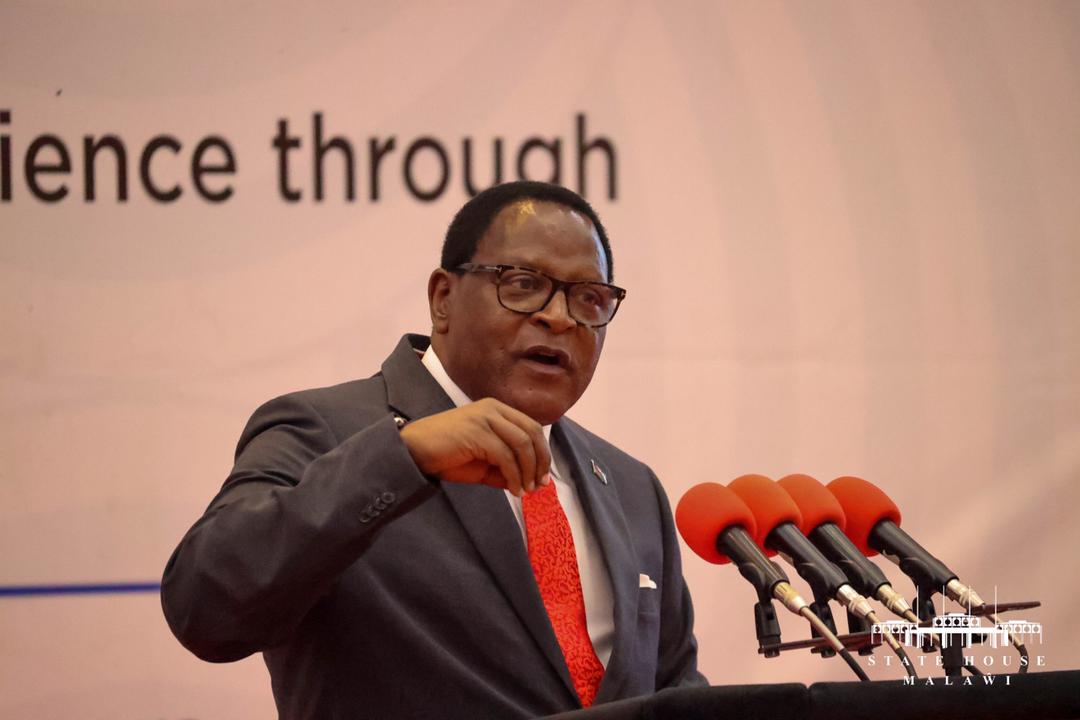Malawi President Dr. Lazarus McCarthy Chakwera has reaffirmed Government of Malawi’s commitment to reducing greenhouse gas emissions, enhancing carbon sinks, and promoting sustainable development practices in line with the Paris Agreement.
The Paris Agreement is a legally binding international treaty on climate change.

Speaking when he presided over the launch of the Southern African Confederation of Agricultural Unions (SACAU) at the Bingu International Convention Centre (BICC) in Lilongwe on Wednesday, President Chakwera said his government is pursuing and promoting the use of renewable energy to mitigate effects of climate change.
“For example, the Malawi Renewable Energy Strategy that aims to increase the use of renewable energy sources and reduce our dependence on fossil fuels is yielding great results. In agriculture, we are promoting conservation agriculture, agroforestry, and other climate-smart practices to enhance resilience and productivity, and we are benefiting from multistakeholder cooperation and investments that are crucial in achieving our nationally determined contributions,” he said.
Chakwera stated that his government’s agriculture, tourism and mining (ATM) strategy places a strong emphasis on revitalizing and transforming the agricultural sector to ensure food security, drive our agro-industrialization agenda, and exponentially catalyse export.
He added that the agricultural aspect of the ATM strategy focuses on improving market access, both locally and internationally, through infrastructure development and value addition, stressing that this is the surest way to ensure that Malawian farmers are richly rewarded for their hard work in the fields.
Chakwera described the hosting of the SACAU conference as an expression of Malawi’s resolve to bring all the agricultural interests and partnerships in the world to bear on our pursuit of prosperity for our farmers.
“Not only does agriculture provide livelihoods for the majority of Malawians, but it is the leading engine for forex generation for our economy. Farmers are the heart of this sector, and their resilience and productivity are crucial for our nation’s prosperity. And since they are also on the frontlines of climate change and natural disasters, which regularly devastate crops and livelihoods, we are eager to gain your insights in how we can better defend their produce against this enemy in line with our nationally determined contributions,” said the Malawi leader.
President Chakwera emphasized that his government’s commitment to developing the capacity and productivity of farmers is the reason the country has been making great strides with regards to the Comprehensive Africa Agriculture Development Programme (CAADP) and the Malabo Declaration.
He cited the increase in budget allocation to agriculture, aligning with the Malabo Declaration’s 10 percent national budget target, resulting in notable growth in agricultural GDP.
He also mentioned the development and implementation of a National Agriculture Policy, aligned with CAADP goals, as having provided a strategic framework for sustainable agricultural development.
“Capacity building and improved extension services have empowered farmers, while initiatives such as the Farm Input Subsidy Programme (FISP) have enhanced productivity. Furthermore, in line with the Malabo Declaration, we have launched programmes to end hunger, promote climate-smart agriculture, improve market access, and prioritize gender and youth inclusion in agriculture,” he said.
Added Chakwera: “We are making these efforts because our farms are under attack from the devastating impacts of climate change events, such as Cyclones Ana, Gombe, and Freddy, as well as the El Nino weather that have all hit us in quick succession in the four years that I have been President, creating acute food shortages and threatening our people with hunger and significantly disrupting the implementation of various agricultural programs in this country.”
